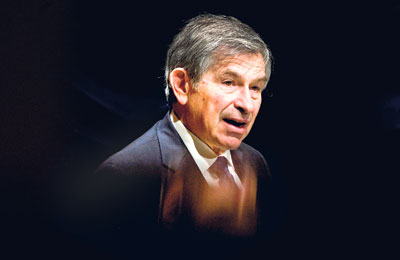
Sunday,
April 29, 2007
Vol.
41 - No 48
A Wolfowitz in sheep’s clothing
NEW YORK - The embattled World Bank President Paul Wolfowitz, who has been crusading against corrupt governments since he took office in 2005, is desperately struggling to save his job. At the time of going to press, he was hanging by a thread. The former US Deputy Defence Secretary, one of the prime architects of the disastrous US war on Iraq, has been reviled for his political double standards: preaching integrity and honesty to the developing world while failing to practise it in his own backyard.Wolfowitz is accused of violating bank rules by re-assigning Shaha Ali Riza, a former Communications Officer in the Middle East Division, to the US State Department while she's still in the bank payroll — and, more importantly, giving her an unusually high salary increase totaling about $193,590 annually compared with the $183,500 earned by the US Secretary of State Condoleezza Rice, who is technically Riza's boss.But the unethical twist to the story — which has been played up in the news media day in and day out — is that Riza is romantically linked to Wolfowitz. She is described as a British national who was born in Libya and lived a good part of her life in Tunisia. Wolfowitz is being pilloried for laying down rigid ethical standards on "corrupt" governments — who depend on World Bank aid for their country's development — but living by a different set of rules in his own professional life. A classic case of blatant hypocrisy.These ethical standards include transparency, accountability, avoidance of conflicts of interest and good governance — some of the conditionalities laid down by international institutions on the developing world. Last year, Wolfowitz suspended debt relief talks with the Congo because he was outraged over the hundreds and thousands of dollars the African nation spent just on five star hotels in New York for an oversized delegation to the UN General Assembly sessions.Sri Lanka, which fielded a delegation of over 80 delegates to the same sessions — unprecedented by UN standards — may have been Wolfowitz's next target for extravagant spending. Incidentally, a visiting Sri Lankan VIP was asked by a World Bank official last week whether it was true that the country's delegation to China numbered 266, as reflected in news reports."Absolutely untrue," said the VIP, "It was really 275". But he justified the elephantine delegation to China on the ground that most of them were businessman from the private sector who paid for their own trips. But mercifully, Sri Lanka would now escape Wolfowitz's wrath because he may not be holding the job for long in order to help implement his good governance and anti-corruption (GAC) policies.Wolfowitz's supporters, mostly right-wing neo-conservatives in the Bush administration, say the attempt to oust him is predicated primarily on his GAC strategy. But the staff association, along with 41 former vice presidents and senior managing directors, say he has lost his moral authority to preside over the bank and should therefore resign. They say the call for his resignation has nothing to do with anti-corruption policies which he has been pursuing.Last week 40 members of the World Bank's anti-corruption team, closely identified with Wolfowitz, made a joint statement critical of the president. "The credibility of our front-line staff is eroding in the face of legitimate questions from our clients about the bank's ability to practise what it preaches on governance," the statement said, driving another nail into Wolfowitz's coffin.Confirming their fears is another twist to the World Bank saga. As an appointee of the Bush administration, Wolfowitz is also accused of trying to implement the Bush agenda in his dealings with developing nations by putting American foreign policy interests before the bank's interests.A widely quoted example is the suspension of aid to Uzbekistan after it refused landing rights to US military aircraft. And, according to the New York Times, his passion for fighting corruption seemed to have evaporated when he reviewed lending money to countries such as Iraq, Afghanistan and Pakistan — countries either militarily occupied by the US and other Western forces, or as in the case of Pakistan, a frontline state in the US global war against terrorism.And that's not acceptable by any international standards — least of all by heads of international institutions. President Bush, who is known to be loyal to his friends, continues to endorse Wolfowitz and proclaims he has the fullest confidence on the beleaguered World Bank President. And Bush expressed similar feelings praising former US Defence Secretary Donald Rumsfeld who was subsequently forced to resign over the war on Iraq. The UN-hating John Bolton, another Bush loyalist who was briefly the US ambassador to the UN, had to quit because he couldn't get Senate confirmation to continue with his job.
Bush is also standing by his Attorney General Alberto Gonzales who has lost the confidence of some of the most senior members of Congress of both the Democratic and ruling Republican Parties. Perhaps Gonzales is also looking for an exit strategy.
One begins to wonder whether Bush's public endorsements unconsciously plant the professional kiss of death on loyalists holding public office. |
|| Front
Page | News | Editorial | Columns | Sports | Plus | Financial
Times | International | Mirror | TV
Times | Funday
Times || |
| |
Copyright
2007 Wijeya
Newspapers Ltd.Colombo. Sri Lanka. |
